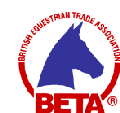 |
Body Protector Standard Aims
To Make Riding Safer
|
WITH improved safety for all riders and
competitors being one of the key priorities for BETA new moves have been made
to try and help cut down on the number of riding injuries.
From September the BETA 1995 Standard will
officially cease to be a valid standard for the manufacture of body
protectors.
The standard was replaced in March last year by
the BETA 2000 Standard and manufacturers were given until the end of August
this year to continue making body protectors to the older standard.
BETA Chief Executive and Secretary Claire
Williams said: “Although after August garments can no longer be
manufactured to the 1995 standard, body protectors made before the September
cut-off point can be sold as long as stocks last.
“The body protectors will also be accepted
by riding organisations specifying that a BETA standardised body protector be
worn in competition.
“However we do recommend against the use
of body protectors manufactured to the standard prior to 1995.
“These body protectors, bearing either a
Level 5 (blue) or Level 7 (red) label, are still seen in use, and BETA
recommend they be replaced with a more recent standard.
“It is important that BETA
highlights the danger of riding in not only an obsolete standard, but also a
potentially less than effective body protector.”
Over the last 12 months, the majority of body
protector manufacturers have adopted the new standard.
The BETA 2000 Standard is identical to EN 13158
but unlike the European Standard, all garments bearing the BETA standard logo
must be re-tested annually to ensure that the quality of the foam and the
quality of the body protector itself remain constant.
Like the previous standard the BETA 2000
features three levels of protection.
Level 1 – Black Label – used
predominantly by jockeys, it offers the lowest amount of protection.
Level 2 – Brown Label – offers a
lower than normal level of protection and is considered really only appropriate
in low risk riding situations.
Level 3 – Purple Label – the highest
level of protection, the body protector is appropriate for normal riding,
competition and for working with horses.
Fitting A Body Protector
BETA Advice
1 As with any protective garment, correct
fitting is crucial in ensuring that it fulfills its intended purpose.
1 The BETA 2000 standard incorporates coloured
safety markers applied to fastenings to indicate when a garment is not fitted
correctly, ensuring that riders can’t over-adjust the body
protector.
2 BETA run a series of safety courses for
retailers to learn more about fitting both riding hats and body
protectors.
When looking to buy a new body protector riders
and competitors should visit a BETA member retailer to get the most up to date
advice.
For further information on body protectors
please contact BETA on (01937) 587062.
 |

